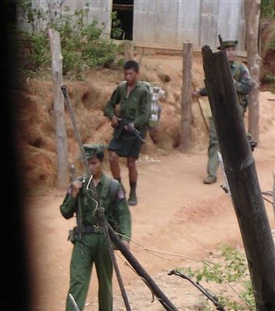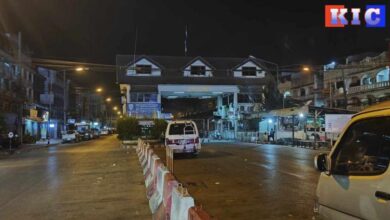Burma Army ‘Raped Over 100 Women’ Since 2010

More than 100 women and girls have been raped by Burma’s military since 2010, according to a report released by the Women’s League of Burma.
The Thailand-based Women’s Leaugue of Burma (WLB) said in a report released today that 47 of the cases documented were gang rapes and 28 of the women were either killed or later died of their injuries.
“WLB and its member organizations have gathered documentation showing that over 100 women have been raped by the Burma Army since the elections of 2010. Due to restrictions on human rights documentation, WLB believes these are only a fraction of the actual abuses taking place.” The group said in a statement to the press.
Burma’s President, Thein Sein, an ex-general, has received widespread international attention for overseeing a rapid opening up of the once isolated nation. His administration’s decision to release political prisoners and liberalize the economy has been met with visits from high-level foreign leaders, such as British Prime Minister David Cameron, and the lifting of sanctions by democratic governments across the world.
Yet the WLB questioned why the Burma Army still committed rape with impunity under Thein Sein’s government, “three years after a nominally civilian government came to power; state-sponsored sexual violence continues to threaten the lives of women in Burma.”
Reuters quoted a government presidential saying that “It’s not the policy of our Tatmadaw [Burma Army] to use rapes as weapons.”
The spokesman added, “If there are rape cases committed by individual members, we try to expose them and take effective action against the offenders. It would be very helpful in taking action against the offenders if those who prepared the report could send us the details of the cases.”
Majority of Cases in Ethnic Areas
The majority of cases were documented in Northern Shan and Kachin States, where the Burma Army has been conducting military offensives since 2011. The Kachin Women’s Association Thailand (KWAT) documented 59 women who had been victims of acts of sexual violence committed by government soldiers, while the Shan Women’s Action Network (SWAN) documented 30 cases of sexual violence involving 35 women and girls in the past three years.
The cases covered a wide range of government units over a large expanse of territory, with over 38 different battalions implicated and the incidents taking place in at least 35 different townships.
The group maintained that the wide area and number of units involved indicated a strategy of rape. “In Burma, counterinsurgency tactics designate civilians in ethnic areas as potential threats. Sexual violence is used as a tool by the Burmese military to demoralize and destroy ethnic communities. Army officers are not only passively complicit in these sexual crimes but often perpetrators themselves.” The group said.
Time for ‘Legal, Constitutional Reform’
In light of the abuses, it was “high time” for constitutional and legal reform to ensure the military could be held accountable and placed under civilian control, the WLB said. “Unless and until the military is placed under civilian control through constitutional amendments, we will not see an end to militarized sexual violence.”
Burma recently received international criticism for its failure to join 134 countries and sign the international declaration for prevention of sexual violence in conflict. While British Foreign Secretary William Hague condemned reports of ongoing sexual violence in October last year as “deeply troubling” in a letter to a UK based human rights organization.
The WLB maintained that the 2008 constitution, which hands 25 percent of seats in parliament to the military and allows it to handle it’s own affairs, a lack of judicial independence, and a military controlled court-martial system, effectively gave it an “unrestricted mandate.”
“To bring justice for the victims of rape and sexual violence, we must take steps to ensure truth, justice and accountability,” said Tin Tin Nyo, General-Secretary of WLB. Tin Tin Nyo added that, “There can be no real reform without stopping all forms of violence, correcting the judicial system, amending the Constitution and enforcing the law to protect women’s lives.”
The WLB also noted that men dominated the peace process currently taking place between 14 ethnic ceasefire groups and the government, with few female voices to represent women. “The fact that almost all the participants involved in the official peace process are male excludes critical perspectives on peace and conflict, and preserves structural gender inequality,” the WLB said, adding, “achieving sustainable peace and putting an end to abuses against women will not happen without women’s representation in the political dialogue for peace.”




